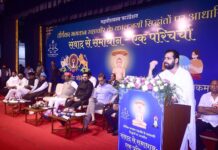 PALO ALTO, CA: Dasis or Gopis, the widows of Vrindavan see themselves as consorts to Lord Krishna, and view Vrindavan as their husband’s home or sasural. Steeped in divine love, they continue their existence within the solitude and deprivation that their place in society as a widow has landed them in.
PALO ALTO, CA: Dasis or Gopis, the widows of Vrindavan see themselves as consorts to Lord Krishna, and view Vrindavan as their husband’s home or sasural. Steeped in divine love, they continue their existence within the solitude and deprivation that their place in society as a widow has landed them in.
They no longer can dream of any other home, in fact, many do not recall, or want to recall their parents’ or in laws’ homes. They prefer to call Vrindavan their abode.
The reality and the fantasy sometimes overlaps and sometimes is starkly unique. The widow’s conflict in this societal issue was raised in Naatak’s 50th production, the grand musical, “Vrindavan” recently in Cubberly Theater in Palo Alto.
This musical seemed befitting its stature as a milestone production, where multi sensory elements, including dance, music, acting, and the story in its concept and creative execution, meld together seamlessly.
Rajiv Nema, the marketing director was thrilled at all the sold out performances, “including the folding chairs”, indicating the huge popularity of this play with the savvy audience. He also shared that there were close to 150 hard working people involved with this production, with only 40 being on stage. It does take a village to pull off a grand production!
Nachiketa Yakkundi and his ensemble of seven, created melodious magic, emoting jubilation, pathos and authenticity, as they wove the magic of the Krishna-Meera divine love into the reality of the widows’ lives. It was also interesting that the visual arts component included younger dancers this time.
Reya Shah and Richa Bhattacharya, both high schoolers, were excited at the opportunity, although admitted how hard it was sometimes to stay focused on academics while having so much fun with rehearsals and the performances. The props and production designers, Savitha Sanu and Snigdha Jain, as well as set director, Asheesh Divetia deserve special mention, for creating the image of Calcutta’s Kalibari, the multi level ashram setting, and the illusion of the Yamuna river, in particular.
The dramatic entry of the twelve widows on stage carrying the basket with the baby Lord Krishna’s idol introduced the audience to the impending occasion of Janmashtami, where the widows would carry the idol across the Yamuna from Mathura to Gokul as part of the celebrations. Their mundane lives then unfolded on stage where their rations were exchanged for a token that they earned from the caretaker, Mishraji, and whose quantity was determined by their dutiful singing of the mandatory bhajans.
A source of great excitement in their bleak lives appears as a scheduled visit to the Kalibari Vidhwa Ashram, by a yesteryears TV artist, Binakumari, who has now become a political figure, an MP (Member of Parliament). This visit spins their lives around in a series of unexpected incidences. Sujit Saraf, in his directorial wisdom has based the character of Binakumari on the real life visit of movie star Hema Malini to Vrindavan, where she made an innocent comment about the widows of Bengal remaining in Bengal, instead of traveling to over-crowded Vrindavan.
There was some serious fall out stemming from this statement, and here it revealed the inner most fears of the dasis, as their place in society was once again threatened if they were sent back to their “homes”.
Binakumari suggests an accurate count of the homeland and family of each dasi to determine who could stay in the crowded ashram. This proclamation to carry out a census of the widows of Vrindavan strikes terror in the hearts of the dasis, who try to derail the data gathering by claiming to forget where their homes where, or if any family members are still alive.
Amidst the austere outlook, and meager existence, the indomitable human spirit cannot be curbed as the essential definition of a breathing, living being, no matter what her condition in life. The dozen widows on stage are shown to be feisty, indulging in raucous gaiety, deviousness and flirtations with men. They derive great glee by reenacting parts of the television show that Binakumari was cast in.
Some act childlike and steal tokens from Mishraji’s trunk at night when they think no one is looking, accompanied with much giggling. Meera dasi, played by Roopcy Dhiman begins to trust and love Murari, played by Navjyoti Sharma, who she meets regularly for trysts. She is, however devastated when that trust is betrayed, and she learns that a widow can never take the place of a wife.
Telling moments presented through dance, song and dialogue reveal how the new widows were given a last meal, gifted a few rupees, and dropped off at the steps of the ashram by their own kith and kin, who never looked back, or inquired about them.
These ladies, many of them mere children had to redefine their identity while living as outcasts. Their families considered them as financial burdens, or as contenders for property, and were sent packing.
For the past five decades, in these ashrams, that they call their “sasural”, they were taught some skills to manage a meager living by making candles or sewing; however many fell on such hard times, that some resorted to begging, or worse, prostitution. Some yearned for information about their once family, while others dreaded it.
As the day of Janmashtami draws near, and the widows keep up the enthusiasm, and gather at the Koile ghats to carry the basket with Lord Krishna’s idol across the Yamuna to Gokul, the mood turns somber. The other dasis ask Protima dasi, convincingly played by Ranjita Chakravarty, the surrogate mother, and leader of the troupe why the boat that was to carry them across had not arrived. Protima’s response stuns everyone, as it is revealed that the widow count at Vrindavan has shown ninety four available spots, and the total residents currently number one hundred and six.
Pinki (Neha Goyal), the mute dasi’s math skills determine the gap to be twelve, which matches the number standing at the shores of Yamuna at that moment.
Led by Protima dasi, one by one, the dasis enter and offer their final prayers to Yamuna, who engulfs this ultimate sacrifice of the twelve widows.
There is felt an audible gasp and suppressed sobs heard from the audience, so poignant is this scene captured on stage.
The drama casts this issue in bold spotlight and dares society to confront the plight of the widows of Vrindavan again. The white saris of women reconciled to a joyless existence striving to maintain a semblance of normalcy, leave a black mark on the foreheads of those that consider such banishment appropriate.
No being should be meted out such a fate by another, by virtue of sheer bad luck befalling them. I applaud Naatak for courageously raising a sensitive issue yet again by showcasing this as their milestone performance, and for throwing a gauntlet for others to take notice. It is no wonder that this drama company has sustained in the Bay Area.
Archana Asthana
India Post News Service






